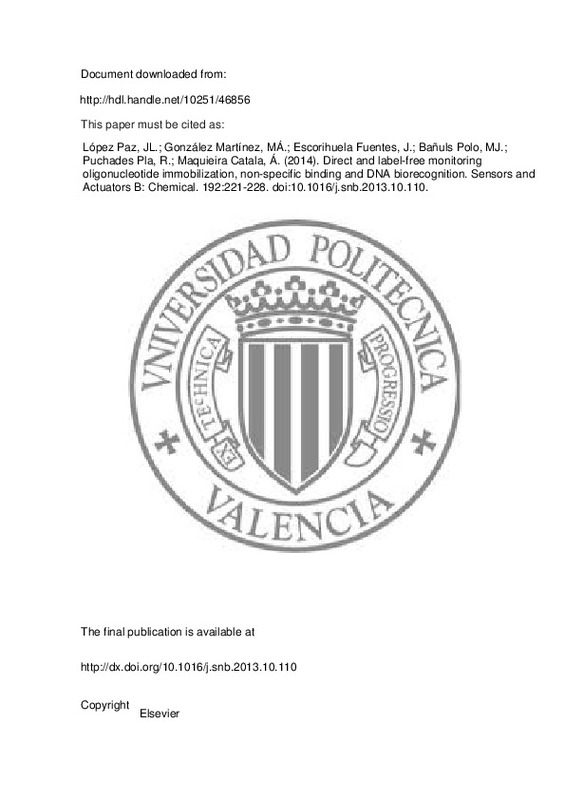JavaScript is disabled for your browser. Some features of this site may not work without it.
Buscar en RiuNet
Listar
Mi cuenta
Estadísticas
Ayuda RiuNet
Admin. UPV
Direct and label-free monitoring oligonucleotide immobilization, non-specific binding and DNA biorecognition
Mostrar el registro sencillo del ítem
Ficheros en el ítem
| dc.contributor.author | López Paz, José Luis
|
es_ES |
| dc.contributor.author | González Martínez, Miguel Ángel
|
es_ES |
| dc.contributor.author | Escorihuela Fuentes, Jorge
|
es_ES |
| dc.contributor.author | Bañuls Polo, Mª José
|
es_ES |
| dc.contributor.author | Puchades Pla, Rosa
|
es_ES |
| dc.contributor.author | Maquieira Catala, Ángel
|
es_ES |
| dc.date.accessioned | 2015-02-09T14:30:01Z | |
| dc.date.available | 2015-02-09T14:30:01Z | |
| dc.date.issued | 2014-03-01 | |
| dc.identifier.issn | 0925-4005 | |
| dc.identifier.uri | http://hdl.handle.net/10251/46856 | |
| dc.description | NOTICE: this is the author’s version of a work that was accepted for publication in Sensors and Actuators B: Chemical. Changes resulting from the publishing process, such as peer review, editing, corrections, structural formatting, and other quality control mechanisms may not be reflected in this document. Changes may have been made to this work since it was submitted for publication. A definitive version was subsequently published in Sensors and Actuators B: Chemical, [VOL 192, (1 March 2014)] DOI 10.1016/j.snb.2013.10.110 | es_ES |
| dc.description.abstract | DNA binding chemistry on silicon surface has been investigated. Aminated oligonucleotide probes were immobilized on the chip surface by chemical silanization and further covalent attachment. The chemistries employed were the classical 3-aminopropyltriethoxysilane/glutaraldehyde and, for comparison purposes, the novel 3-isocyanatepropyltriethoxysilane, that allows the direct attachment of the aminated probe. Alternatively, a thiolated oligonucleotide was also photochemically immobilized by means of a thioether linkage. The experiments were followed label-free by Dual Polarization Interferometry. All chemical and photochemical methods gave rise to a probe density immobilization in the order of 1.0-2.5 x 10(10) molecules/mm(2), similar to the values reported for other chemistries. The obtained data suggest that DNA strands are anchored in a different conformation depending on the immobilization method employed. In order to avoid non-specific binding of target molecules, ethanolamine and inert proteins were assayed, and successful results were obtained when using small size proteins such as gelatine. Hybridization efficiency was around 20% for aminosilane-based immobilized probes, and more than 4-fold this value when the other immobilization methods were employed. The ability for recognition complementary DNA strands discriminating non-complementary ones was applied for species identification in mixtures. (C) 2013 Elsevier B.V. All rights reserved. | es_ES |
| dc.description.sponsorship | Research projects MASCREEN CTQ2010-15943 from the Spanish Ministerio de Ciencia e Innovacion, and PROMETEO 2010/008 from the Generalitat Valenciana are gratefully acknowledged for financial support. | en_EN |
| dc.language | Inglés | es_ES |
| dc.publisher | Elsevier | es_ES |
| dc.relation.ispartof | Sensors and Actuators B: Chemical | es_ES |
| dc.rights | Reserva de todos los derechos | es_ES |
| dc.subject | DNA immobilization | es_ES |
| dc.subject | Silicon | es_ES |
| dc.subject | Surface chemistry | es_ES |
| dc.subject | Dual Polarization Interferometry | es_ES |
| dc.subject | Biosensing | es_ES |
| dc.subject.classification | QUIMICA ANALITICA | es_ES |
| dc.title | Direct and label-free monitoring oligonucleotide immobilization, non-specific binding and DNA biorecognition | es_ES |
| dc.type | Artículo | es_ES |
| dc.identifier.doi | 10.1016/j.snb.2013.10.110 | |
| dc.relation.projectID | info:eu-repo/grantAgreement/MICINN//CTQ2010-15943/ES/ESTUDIO DE NUEVAS VIAS DE DESARROLLO DE BIOMEMS PARA SCREENING MASIVO. DEMOSTRACION DE CONCEPTO COMO HERRAMIENTA DE ANALISIS APLICABLE EN "OMICAS"./ | es_ES |
| dc.relation.projectID | info:eu-repo/grantAgreement/GVA//PROMETEO%2F2010%2F008/ | es_ES |
| dc.rights.accessRights | Abierto | es_ES |
| dc.contributor.affiliation | Universitat Politècnica de València. Departamento de Química - Departament de Química | es_ES |
| dc.contributor.affiliation | Universitat Politècnica de València. Instituto de Reconocimiento Molecular y Desarrollo Tecnológico - Institut de Reconeixement Molecular i Desenvolupament Tecnològic | es_ES |
| dc.description.bibliographicCitation | López Paz, JL.; González Martínez, MÁ.; Escorihuela Fuentes, J.; Bañuls Polo, MJ.; Puchades Pla, R.; Maquieira Catala, Á. (2014). Direct and label-free monitoring oligonucleotide immobilization, non-specific binding and DNA biorecognition. Sensors and Actuators B: Chemical. 192:221-228. https://doi.org/10.1016/j.snb.2013.10.110 | es_ES |
| dc.description.accrualMethod | S | es_ES |
| dc.relation.publisherversion | http://dx.doi.org/10.1016/j.snb.2013.10.110 | es_ES |
| dc.description.upvformatpinicio | 221 | es_ES |
| dc.description.upvformatpfin | 228 | es_ES |
| dc.type.version | info:eu-repo/semantics/publishedVersion | es_ES |
| dc.description.volume | 192 | es_ES |
| dc.relation.senia | 254836 | |
| dc.contributor.funder | Ministerio de Ciencia e Innovación | es_ES |
| dc.contributor.funder | Generalitat Valenciana | es_ES |







![[Cerrado]](/themes/UPV/images/candado.png)

